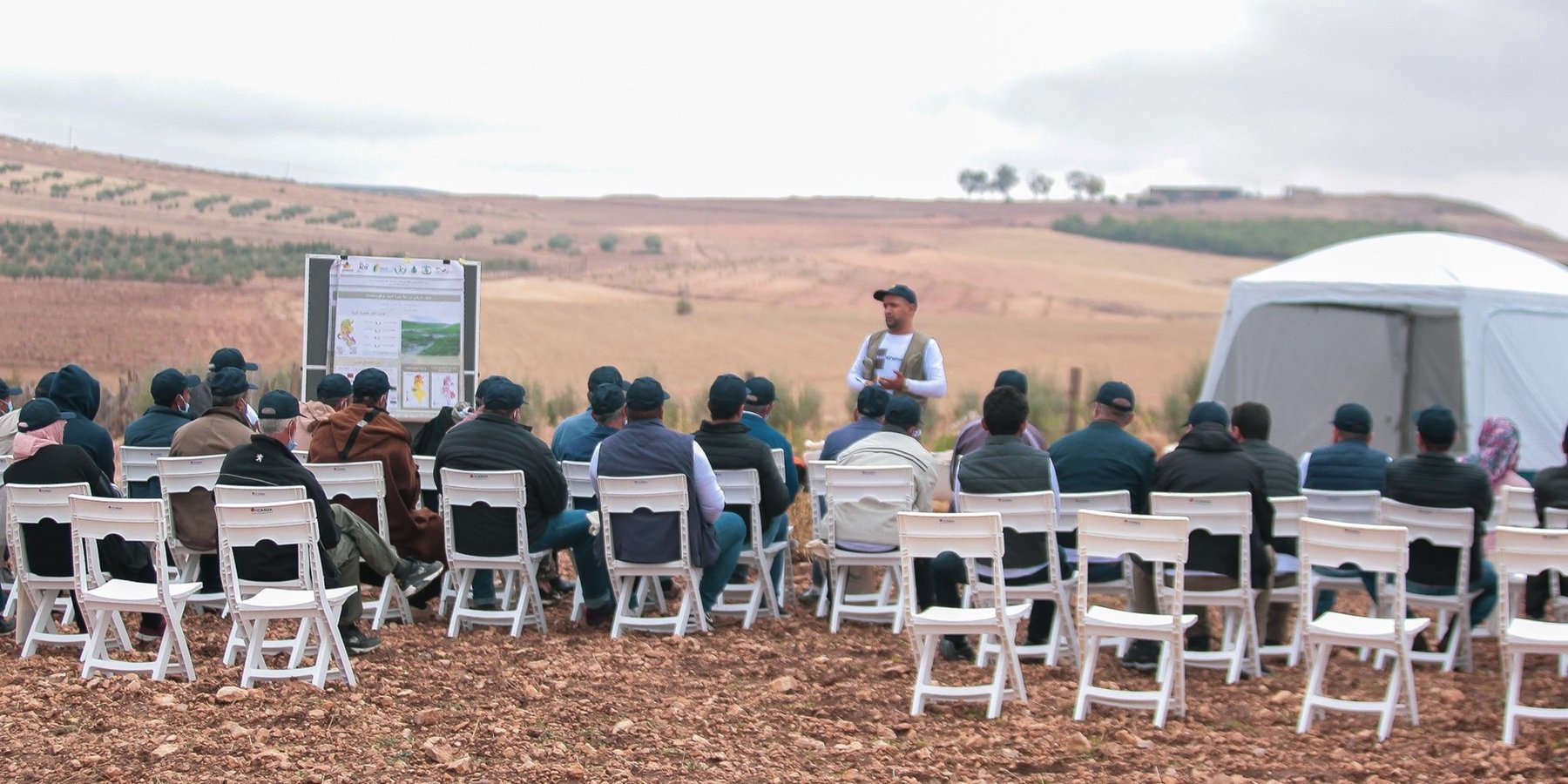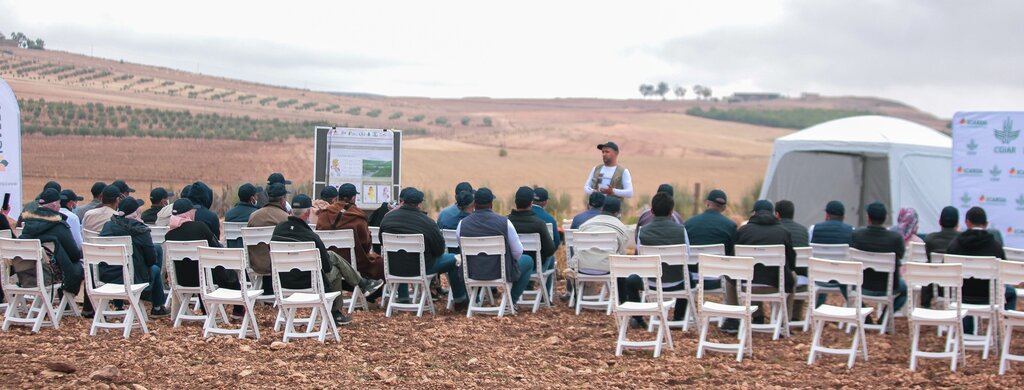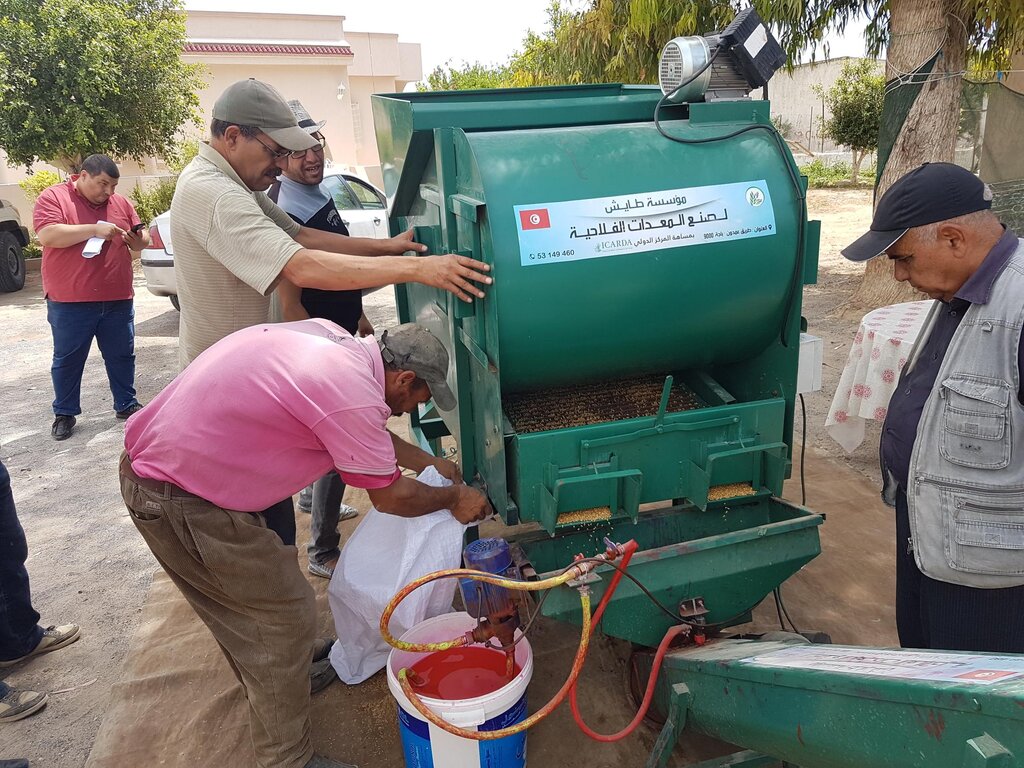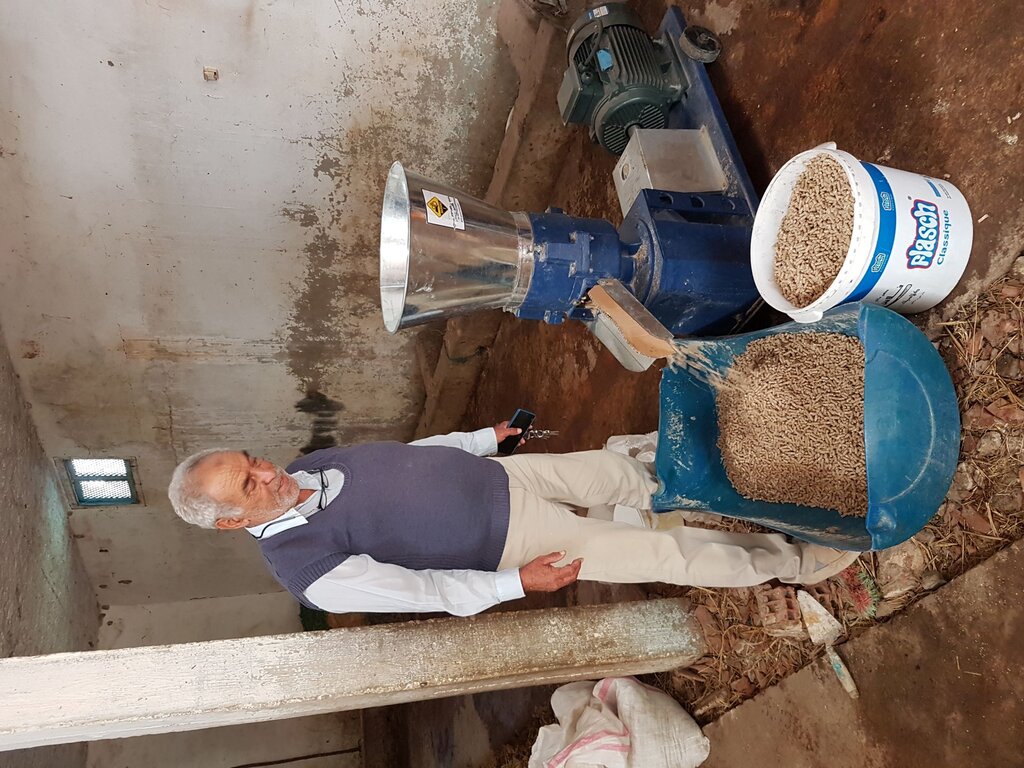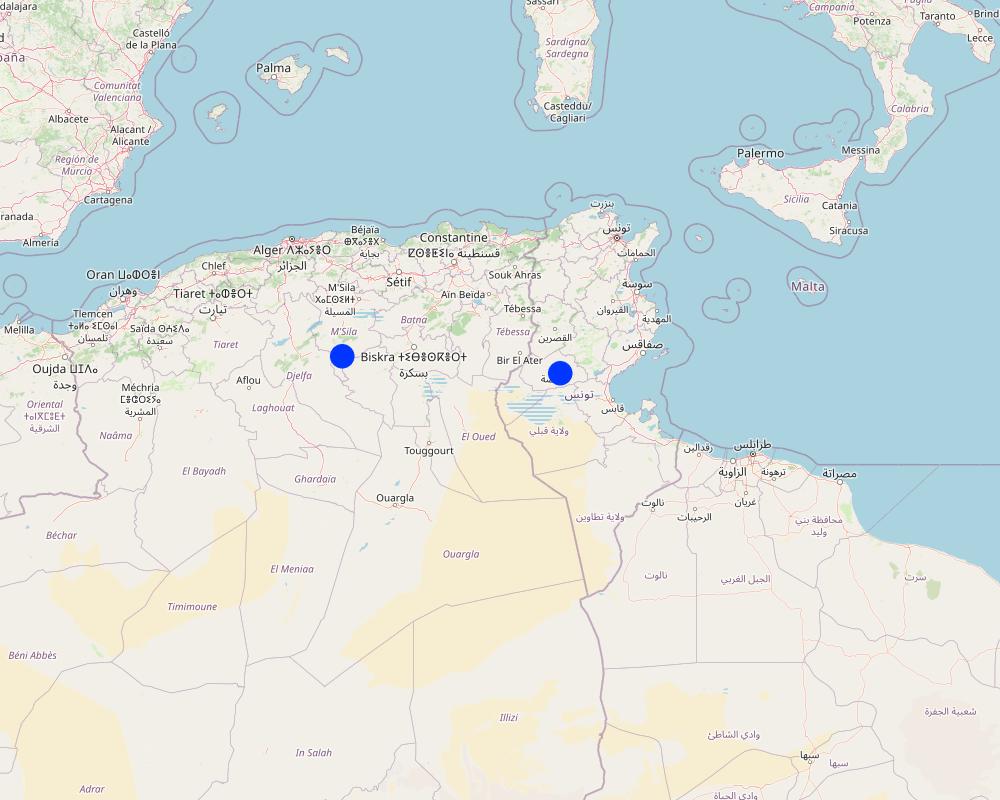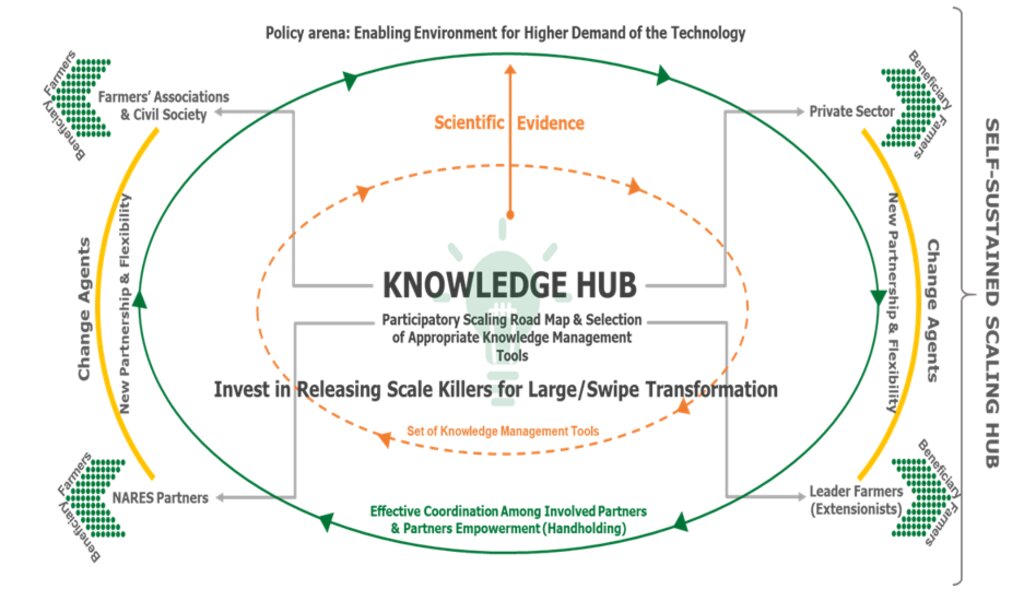The 4-Wheels Approach for sustainable scaling [突尼斯]
- 创建:
- 更新:
- 编制者: Joren Verbist
- 编辑者: –
- 审查者: William Critchley, Rima Mekdaschi Studer
approaches_6885 - 突尼斯
查看章节
全部展开 全部收起1. 一般信息
1.2 参与方法评估和文件编制的资源人员和机构的联系方式
关键资源人员
Agricultural Economist:
Aymen Frija
International Center of Agricultural Research in Dry Areas (ICARDA)
突尼斯
Specialist on Economics and Participatory Methods:
Idoudi Zied
International Center of Agricultural Research in Dry Areas (ICARDA)
突尼斯
Agricultural Innovation Specialist:
Rudiger Udo
International Center of Agricultural Research in Dry Areas (ICARDA)
突尼斯
有助于对方法进行记录/评估的项目名称(如相关)
ICARDA Institutional Knowledge Management Initiative有助于对方法进行记录/评估的机构名称(如相关)
International Center for Agricultural Research in the Dry Areas (ICARDA) - 黎巴嫩1.3 关于使用通过WOCAT记录的数据的条件
(现场)数据是什么时候汇编的?:
2022
编制者和关键资源人员接受有关使用通过WOCAT记录数据的条件。:
是
1.4 SLM技术问卷的参考
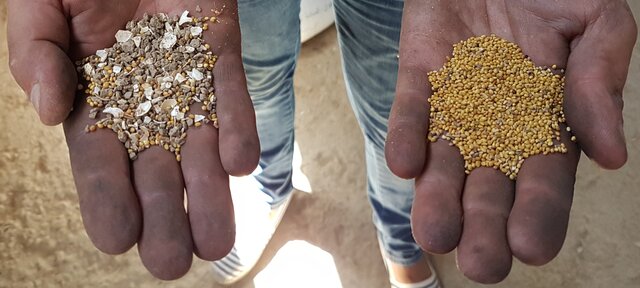
Small-Scale Seed Cleaning Unit [突尼斯]
The mobile seed cleaning machine improves the livelihoods of smallholder farmers in Tunisia by significantly enhancing seed quality, increasing crop production, reducing workload and costs, and promoting local value chains and social cohesion.
- 编制者: Joren Verbist
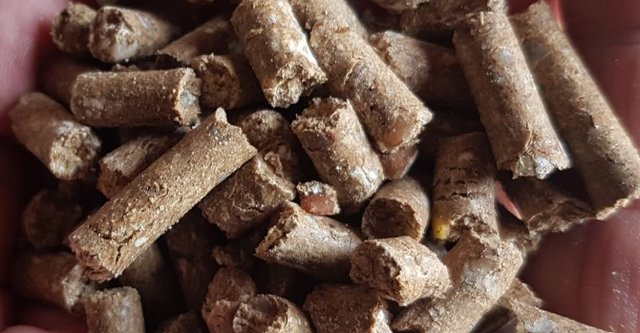
Small-Scale Nutrient-Dense Pellet Production [突尼斯]
Compressing agro-industrial by-products produces nutrient-dense livestock feed pellets that can compete with expensive and imported alternatives. This innovation consists of a small-scale compressor or "pelletizer" and formulae to create feed pellets of sufficient quality with locally available inputs.
- 编制者: Joren Verbist
2. SLM方法的描述
2.1 该方法的简要说明
The 4-Wheels Approach addresses the challenge of slow adoption of agricultural innovations among smallholder farmers by establishing Knowledge Hubs and partnerships with diverse stakeholders. The focus is on income-generating technologies and essential factors behind successful scaling up of innovations, ultimately driving agricultural modernization and sustainability.
2.2 该方法的详细说明
该方法的详细说明:
The challenge of low and slow adoption of innovations from agricultural research by smallholder farmers is difficult, complex, and is impeding the progress of agricultural modernization in many developing countries. This issue has negative consequences on farm productivity and farmers' livelihoods. Furthermore, it influences the outcomes of investments made by both national and international agricultural research and development initiatives. The problem is exacerbated by evolving climatic and social conditions, which makes more urgent the need for systemic transformation and modernization to enhance food production - while ensuring sustainability.
To confront this challenge of low rates of scaling up and adoption, the International Center of Agricultural Research in Dry Areas (ICARDA) introduced and validated the “4-Wheels Approach” in countries where ICARDA is active, including Algeria and Tunisia. Among other innovations, two types of machinery are being scaled up this way: (a) the pelletizer (which creates feed pellets from by-products) and (b) the seed cleaning machine (for mechanical seed cleaning, substantially reducing workload). Both technologies have been documented in WOCAT’s global database.
The 4-Wheels Approach is built upon Knowledge Hubs and dynamic partnerships. Knowledge Hubs encompass physical structures, such as (informal) training centres, which usually belong to local farmers’ associations and cooperatives. The purpose of these hubs is to refine and disseminate knowledge locally in a self-sustained way, potentially through established partnerships with key local and regional stakeholders and scaling partners. Four categories of stakeholders, also referred to as change-agents and facilitators of technology dissemination, are identified: i) farmers’ groups and various other local associations, ii) civil society (including non-governmental organizations (NGOs) and the private sector), iii) national public development partners, and iv) lead farmers and extensionists, all of whom play a pivotal role in holding the key knowledge about the technology and spreading it locally. Consequently, these Knowledge Hubs serve to further adapt and mainstream technical knowledge through intermediary beneficiaries (also called proxies or “ambassadors” of the technology), who in turn facilitate dissemination to the ultimate users and beneficiaries, namely the farmers. Viewing the approach’s scaling and Knowledge Hubs through this lens underscores the necessity of investing in continuous and comprehensive networking, which doesn’t overlook any of the possible and relevant scaling partners.
The implementation of the 4-Wheels Approach via Knowledge Hubs and collaborative partnerships has emerged as a compelling strategy for challenges in the uptake of agricultural innovations, fostering a sustainable pathway towards modernization, and thus uplifting the well-being of smallholder farmers in developing areas. The concepts of 4-Wheels Approach and Knowledge Hubs are closely related and interlinked/integrated. The participation of the four types of partners who are engaged through the 4-Wheels Approach within the Knowledge Hub activities allows them to better understand, participate and advocate for relevant local innovations. The 4-Wheels Approach ensures the concentrated involvement of scaling partners of different background within the same landscape, and thus efforts to engage innovation actors become more fruitful by being more accessible and inclusive.
Acknowledgement: This research was funded by the CLCA project (funded by IFAD), PROSOL (funded by GIZ), and OneCGIAR initiative on agroecology. All of the previous projects and initiatives are implemented and coordinated by the International Center for Agricultural Research in the Dry Areas (ICARDA). The projects partnered with national partners including the OEP (Office de l’elevage et des pâturages) for the training of the cooperatives, as well as Tunisia’s National Agricultural Research Institute (Institut National de la Recherche Agronomique en Tunisi, INRAT) and the National Institute of Field Crops (Institut National des Grands Cultures, INGC) which selected the cooperatives, and the Regional Department for Agricultural Development (Commissariat Regional de Développement Agricole, CRDA) which facilitated the access to farmers communities and creation of knowledge hubs. We would like to thank all partners for their contributions and collaboration.
2.3 该方法的照片
2.5 采用该方法的国家/地区/地点
国家:
突尼斯
Map
×2.6 该方法的开始和终止日期
若不知道准确的年份,请注明该方法的大致开始日期。:
不到10年前(最近)
2.7 方法的类型
- 基于项目/方案
2.8 该方法的主要目的/目标
The aim of this approach is to achieve sustainable scaling and foster greater adoption of innovations. This is pursued through the establishment of Knowledge Hubs (as spaces of innovation) where, the formation of partnerships (based on the 4-Wheels Approach), and the research into viable business models is carefully and step-wise implemented (in reference list see the protocol for implementation in Frija & Idoudi 2020).
2.9 推动或妨碍实施本办法所适用的技术的条件
财务资源和服务的可用性/可得性
- 阻碍
A minimum of financial resources are needed to create and establish the knowledge hub in the form of informal training center at the cooperative and farmers association level. These fees aims at creating a local space for the community which can be “pedagogically” relevant for further exchange, discussions, trainings, and joint decision making by the community. Such spaces are material investments which can partly enhance the social capital and support the process of building collective cognitive capacity of farmers.
机构设置
- 阻碍
The 4-Wheels Approach supports the process of technology transfers in countries where there is a lack of connections and collaboration between research and development. Under such institutional conditions where extension services are low and unavailable, and where research programs are disconnected from the real concrete problems and development bottlenecks, the 4-Wheels approach can be instrumental to leverage the public investments in technology transfers by creating local performing knowledge hubs which would remain sustainable thanks to the mobilization of all relevant innovation and scaling partners (as identified in the 4-wheel partners typology – see above
参与者的的协作/协调
- 启动
This was rather enabling as different actors like OEP (livestock agency) on the regional level as well as national level were always willing to collaborate with ICARDA and the different beneficiary communities of our different projects (listed in the acknowledgement). This is also especially relevant given that the early technologies for which we built and started piloting the concept of knowledge hubs and partnership for scaling were focusing on forage crops and forage mixtures . Also INRAT was happy to collaborate in the development of the concepts and to also facilitate the overall process of partners mobilization, including collaboration with private actor such as forage seeds companies, pelletizer or seed cleaning manufacturers etc
了解SLM,获得技术支持
- 启动
Technical support was guaranteed by OEP, INRAT and ICARDA and private actor. The whole idea of these partners is to generate knowledge through experimentation and demonstration, and sustain it through capacity development and partnership/networking. Communities and particularly farmers associations were key in this regards as these are supposed to be the main holders of knowledge after the project ending. The whole process of creation of KHs aims at enhancing and sustaining knowledge about key agricultural practices and technologies locally, thus making it more inclusive and accessible.
市场(购买投入,销售产品)和价格
- 启动
Theoretically, markets and prices are not key aspects since we are talking about knowledge. Currently, the problem is about access to lacking knowledge by smallholder farmers and is not about “price of the knowledge” or who is paying for it. However, scaling of KH themselves would involve the development of a business model in which “payment for knowledge” would be key for its scaling and sustainability.
3. 相关利益相关者的参与和角色
3.1 该方法涉及的利益相关者及其职责
- 当地土地使用者/当地社区
Farmer Cooperatives
Farmers communities, cooperatives and members are asked to engage into the participatory innovation process by defining their needs, problems, and helping to identify possible affordable solutions. They are also asked to offer a space of concentration where the overall R4D teams can meet, interact and discuss. This space is meant to be sustainable and will be used by the cooperative after the end of the project.
- 研究人员
INRAT and OEP
Researchers are asked to facilitate the whole process of community engagement and Knowledge Hub installation. They are also asked to install some local experiments which can provide more contextual knowledge about technologies benefits and impact in specific localities. Researchers are also asked to design and facilitate appropriate networking event thus connecting the cooperatives with all relevant public and private actors who are operating for the considered technologies of the Knowledge Hub.
- 私营部门
Manufacturer of the seed cleaning unit and Importer of the Pelletizer machine
Private sector in general, supports the communities with some capacity development activities in case they are providers of the technology to be scaled (object of the Knowledge Hubs).
They also ensure good affordable and reliable access of farmers of the community to the relevant technologies object of the hub.
In this case, they did: design and produce, or import machine; train farmers in use and maintenance; perform after sale services
- 国际组织
ICARDA
Lead and coordination; installation of the hub, facilitation between research and development actors; organize training and demonstration
如果涉及多个利益相关者,请注明领导机构:
ICARDA
3.2 当地土地使用者/当地社区参与该方法的不同阶段
| 当地土地使用者/当地社区的参与 | 指定参与人员并描述活动 | |
|---|---|---|
| 启动/动机 | 无 | ICARDA and OEP led discussion with the importer and manufacturer. |
| 计划 | 无 | Discussion between ICARDA, OEP, GIZ, INGC, to identify potential beneficiaries of the machines. |
| 实施 | 互动 | ICARDA and OEP discussed with farmer cooperatives their interests in the machines. ICARDA, OEP, and manufacture produced and distributed the machines. Financial contribution of the farmer cooperation was requested to foster ownership. |
| 监测/评估 | 互动 | ICARDA and OEP visits the farmer cooperatives every three months to collect business data, see if the machine operates correctly, and to identify constraints. |
3.3 流程图(如可用)
具体说明:
The 4-Wheels Approach for effective partnership for scaling
作者:
Aymen Frija, Zied Idoudi. (18/12/2020). Self-Sustained “Scaling Hubs” for Agricultural Technologies: Defnition of Concepts, Protocols, and Implementation. (ICARDA)
3.4 有关SLM技术选择的决策
具体说明谁有权决定选择要实施的技术:
- 仅限SLM专家
解释:
ICARDA and partners investigated relevant and suitable technologies. Essential was that the business model is self-sustaining.
明确做出决策的依据:
- 对充分记录的SLM知识进行评估(基于证据的决策)
- 研究结果
- 个人经验和意见(无记录)
4. 技术支持、能力建设和知识管理
4.1 能力建设/培训
是否为土地使用者/其他利益相关者提供培训?:
是
明确受训人员:
- 土地使用者
如果相关,请说明性别、年龄、地位、种族等。:
Farmers of the cooperation were trained
培训形式:
- 在职
- 示范区域
- 公开会议
- 课程
涵盖的主题:
The use of the machinery, their maintenance and recipes for pellets
4.2 咨询服务
土地使用者有权使用咨询服务吗?:
是
指明是否提供了咨询服务:
- 在土地使用者的土地上
4.3 机构强化(组织发展)
是否通过这种方法建立或加强了机构?:
- 是,适度
具体说明机构的强化或建立程度:
- 本地
说明机构、角色和职责、成员等。:
Farmer cooperation and knowledge hubs were established. The rationale is that because the machines are economically viable on their own, the cooperation will keep on sharing the knowledge using the hubs.
具体说明支持类型:
- 能力建设/培训
- 设备
4.4 监测和评估
监测和评估是该方法的一部分吗?:
是
注释:
By monitoring certain indicators, such as the number of beneficiaries, pellets produced, seed cleaned, etc. In addition, ICARDA is frequently visiting the hubs to see progress and solve problems that occurred.
若是,该文件是否用于监测和评估?:
是
4.5 研究
研究是该方法的一部分吗?
是
明确话题:
- 社会学
- 经济/市场营销
- 生态学
- 技术
5. 融资和外部物质支持
5.1 该方法中SLM组成部分的年度预算
如果不知道准确的年度预算,请给出一个范围:
- 10,000-100,000
注释(例如主要的资助来源/主要捐助者):
This includes the machines and trainings.
5.2 为土地使用者提供财政/物质支援
土地使用者是否获得实施该技术的财政/物质支持?:
是
如果是,请具体说明支持的类型、条件和提供者:
The land users, organized in farmer cooperation, were supported with machinery
5.3 对特定投入的补贴(包括劳动力)
- 设备
| 具体说明哪些投入得到了补贴 | 程度如何 | 对补贴做出具体说明 |
|---|---|---|
| 机械 | 部分融资 | The farmer cooperatives made a financial contribution. |
5.4 信用
是否根据SLM活动的方法给予信用值?:
否
5.5 其它激励或手段
是否有其他激励措施或工具用于促进SLM技术的实施?:
否
6. 影响分析和结论性陈述
6.1 方法的影响
该方法是否有助于当地土地使用者,提高利益相关者的参与度?:
- 否
- 是,很少
- 是,中等
- 是,支持力度很大
Land users were empowered because the machines strengthen the cooperatives.
该方法是否帮助土地使用者实施和维护SLM技术?:
- 否
- 是,很少
- 是,中等
- 是,支持力度很大
该方法是否提高了土地使用者实施土地管理的知识和能力?:
- 否
- 是,很少
- 是,中等
- 是,支持力度很大
Farmers received training on how to operate and maintain the machinery, but they are still struggling with the optimal recipes for the pellets.
该方法是否建立/加强了机构、利益相关者之间的合作?:
- 否
- 是,很少
- 是,中等
- 是,支持力度很大
The projects was a successful collaboration between many different organization. Its success has strengthen the relations.
该方法是否改善了性别平等并赋予女性权力?:
- 否
- 是,很少
- 是,中等
- 是,支持力度很大
Conventionally, the cleaning of seeds was done by hand by women and children. The use of machinery has substantially lowered their workload.
该方法是否改善了粮食安全/改善了营养?:
- 否
- 是,很少
- 是,中等
- 是,支持力度很大
The use of the machinery lead to improved food security.
6.2 土地使用者实施SLM的主要动机
- 增加生产
- 增加利润(能力),提高成本效益比
- 降低灾害风险
- 减少工作量
6.3 方法活动的可持续性
土地使用者能否维持通过该方法实施的措施(无外部支持的情况下)?:
- 是
若是,请说明如何维持:
The machines on their self are economically viable.
6.4 该方法的长处/优点
| 土地使用者眼中的长处/优势/机会 |
|---|
| Seed Cleaning Unit: better seeds, improves yield, higher income, less workload |
| Feed Pelletizer: use of agricultural by-products, cheap compound feed, less workload |
| 编制者或其他关键资源人员认为的长处/优势/机会 |
|---|
| Major strength of the 4-Wheels approach is the aspect of the collaboration, between private actor (machine manufacturer or importer), farmer organization, lead farmer of the organization, OEP (extension), INRAT (research for composition). This multi-actor collaboration is key of the 4-wheel approach and key of the success of the scaling of the two technologies |
| Seed Cleaning Unit: better seeds, improves yield, higher income, less workload |
| Feed Pelletizer: use of agricultural by-products, cheap compound feed, less workload |
| The 4-Wheels Approach ensures ownership over the machinery while building capacity |
6.5 该方法的弱点/缺点以及克服它们的方法
| 土地使用者认为的弱点/缺点/风险 | 如何克服它们? |
|---|---|
| Feed Pelletizer: Farmers still don’t know the optimum mixture of ingredients to produce pellets for each region and categories of animals (sheep / cow / camel). | Intense collaboration with agricultural research |
| 编制者或其他关键资源人员认为的弱点/缺点/风险 | 如何克服它们? |
|---|---|
| A risk of the approach is the sustainability. It is not sure (yet) if and how the knowledge hub will continue once there is no more support from ICARDA and (national) partners. |
The theoretical idea is that through the income generation with these machines they (farmer organization) will continue training others and sharing their knowledge. But this theory needs to be validated and proven. |
| Seed Cleaning Unit: quite expensive for a small scale farmer (7,000 US$ nowadays) | To buy the unit as a farmer organization (cooperation) and use it by many farmers |
| The Feed Pelletizer can be expensive for individual small scale farmer, availability of spare parts of pelletizing machine only in Tunis (access problem), needs available by-products (they are only seasonable), need access to subsidized barley and wheat bran to produce at competitive prices. Farmer organizations have no quota for subsidized barley and wheat bran, only individual farmers to a limited amount and feed enterprises | To use the feed pelletizer as a group to reduce costs per farmer; transform cooperative into a feed processing enterprise as they have access to subsidized barley and wheat bran |
7. 参考和链接
7.1 方法/信息来源
- 与SLM专业人员/专家的访谈
- 根据报告和其他现有文档进行编译
7.3 链接到网络上可用的相关信息
标题/说明:
Aymen Frija, Zied Idoudi. (18/12/2020). Self-Sustained “Scaling Hubs” for Agricultural Technologies: Definition of Concepts, Protocols, and Implementation. Lebanon: International Center for Agricultural Research in the Dry Areas (ICARDA).
URL:
https://hdl.handle.net/20.500.11766/12248
标题/说明:
Mourad Rekik, Aymen Frija, Zied Idoudi, Santiago López Ridaura, Nasreddine Louahdi, Boubaker Dhehibi, Dina Najjar, Udo Rudiger, Enrico Bonaiuti, Laura Becker, Zohra Djender Ghallem, Hatem Cheikh M'hamed, Mina Devkota Wasti, Barbara Rischkowsky. (11/3/2021). Use of Conservation Agriculture in Crop-Livestock Systems (CLCA) in the Drylands for Enhanced Water Use Efficiency, Soil Fertility and Productivity in NEN and LAC Countries – Progress Highlights: Year (3) - April 2020 to March 2021. Lebanon: International Center for Agricultural Research in the Dry Areas (ICARDA).
URL:
https://hdl.handle.net/20.500.11766/12703
标题/说明:
Aymen Frija, Zied Idoudi, Udo Rudiger, Jebali Oussama, Hatem Cheikh M'hamed, Haithem Bahri, Boubaker Dhehibi, Mourad Rekik, Imen Hemissi, Salah Ben Youssef, Khouloud Chetoui, Mounir Louhaichi, Mouldi Gamoun, Asma Souissi. (6/12/2022). Soil Protection and Rehabilitation of Degraded Soil for Food Security – ProSol: Towards the Effective Scaling of Soil and Water Conservation Technologies under Different Agroecosystems in North and Central West Tunisia – SWC@Scale/ProSol: Technical Progress Report/ January – August 2022. Beirut, Lebanon: International Center for Agricultural Research in the Dry Areas (ICARDA).
URL:
https://hdl.handle.net/20.500.11766/67835
链接和模块
全部展开 全部收起链接

Small-Scale Seed Cleaning Unit [突尼斯]
The mobile seed cleaning machine improves the livelihoods of smallholder farmers in Tunisia by significantly enhancing seed quality, increasing crop production, reducing workload and costs, and promoting local value chains and social cohesion.
- 编制者: Joren Verbist

Small-Scale Nutrient-Dense Pellet Production [突尼斯]
Compressing agro-industrial by-products produces nutrient-dense livestock feed pellets that can compete with expensive and imported alternatives. This innovation consists of a small-scale compressor or "pelletizer" and formulae to create feed pellets of sufficient quality with locally available inputs.
- 编制者: Joren Verbist
模块
无模块


